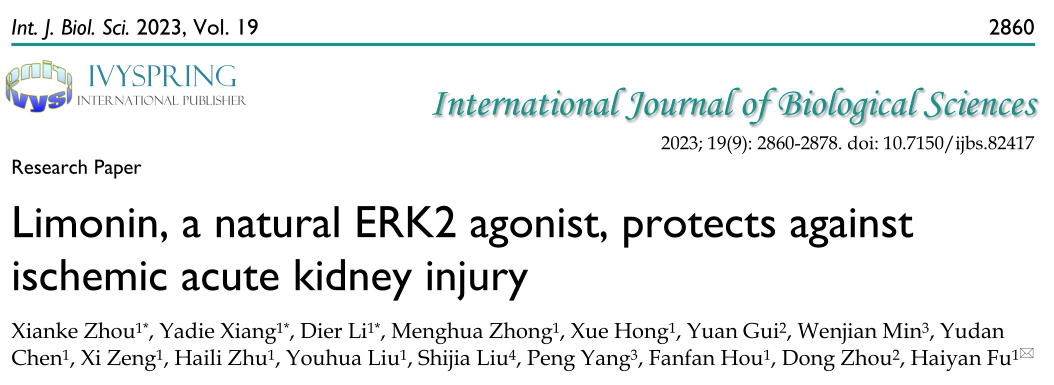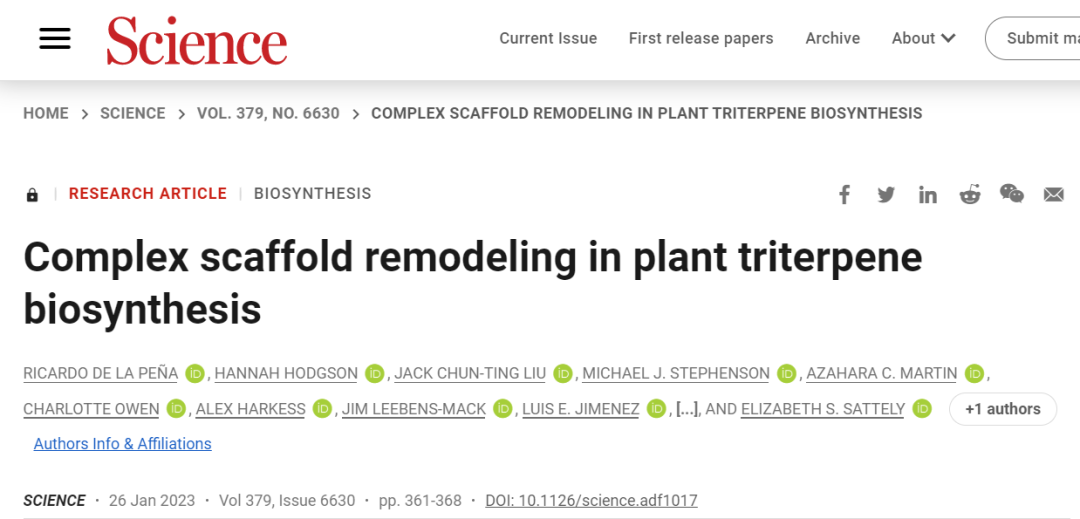预约演示
更新于:2025-10-18
Limonin
柠檬苦素
更新于:2025-10-18
概要
基本信息
结构/序列
分子式C26H30O8 |
InChIKeyKBDSLGBFQAGHBE-MSGMIQHVSA-N |
CAS号1180-71-8 |
关联
1
项与 柠檬苦素 相关的临床试验CTR20132997
柠檬苦素胶囊与安慰剂对照治疗痔疮(湿热下注证)随机、双盲单模拟、多中心临床试验
以安慰剂对照,初步评价柠檬苦素胶囊治疗痔疮(湿热下注证)的安全性、有效性
开始日期- |
申办/合作机构  中国药科大学 中国药科大学 [+1] |
100 项与 柠檬苦素 相关的临床结果
登录后查看更多信息
100 项与 柠檬苦素 相关的转化医学
登录后查看更多信息
100 项与 柠檬苦素 相关的专利(医药)
登录后查看更多信息
1,166
项与 柠檬苦素 相关的文献(医药)2026-01-01·JOURNAL OF ETHNOPHARMACOLOGY
LC and molecular docking-based analysis of bitter compounds in Aurantii Fructus Immaturus and their bran-frying modulation on mitochondrial energy metabolism in STC rats
Article
作者: Fan, Jia-Qi ; Bi, Qiu-Ru ; Yao, Yi ; Lin, Gui-Mei ; Zhao, Wen-Yuan ; Li, Hong-Ye
ETHNOPHARMACOLOGICAL RELEVANCE:
Aurantii Fructus Immaturus is a traditional qi-regulating herb with a bitter, slightly sour taste and refreshing aroma. It breaks stagnant qi, promotes digestion, resolves phlegm, and treats constipation. Clinically, its bran-fried form moderates its potent properties. However, the material basis of its bitterness and its link to energy metabolism modulation remain unclear.
AIM OF THE STUDY:
To screen bitter constituents of Aurantii Fructus Immaturus using molecular docking and high-performance liquid chromatography (HPLC), and to examine the changes in key bitter compound contents before and after bran-frying of different sources. Further, to investigate the impact of these bitter constituents on mitochondrial energy metabolism in rats with slow transit constipation (STC) through pharmacodynamic experiments.
MATERIALS AND METHODS:
Using molecular docking technology and molecular dynamics simulations, the chemical components of Aurantii Fructus Immaturus were docked with bitter taste receptors to screen for potential bitter compounds. HPLC was used to quantitatively analyze the key bitter constituents of Aurantii Fructus Immaturus from various sources before and after bran-frying. STC was induced in rats with loperamide hydrochloride, followed by interventions with Aurantii Fructus Immaturus and bran-fried products, as well as their bitter constituents. Therapeutic effects were evaluated through assessments of mental state, body weight, and fecal morphology. Histopathological changes in colonic tissues were observed using hematoxylin and eosin (HE) staining. Mitochondrial respiratory chain complex activities and ATP levels in colonic and gastric tissues were measured via ELISA to assess mitochondrial energy status. Real-time quantitative PCR (qPCR) and Western blot analyses determined the mRNA and protein expression levels of Drp1, Mfn1, Mfn2, Opa1, and Fis1 in colonic mitochondria.
RESULTS:
Molecular docking identified 36 bitter chemical constituents, mainly flavonoids and limonoids, including naringin, hesperidin, and others. Twelve major bitter components-naringin, neohesperidin, hesperidin, eriocitrin, narirutin, didymin, poncirin, nobiletin, tangeretin, limonin, nomilin, and obacunone-were used as indicators in this study. HPLC content analysis and statistical evaluation revealed that the main sources of bitter taste differences among Aurantii Fructus Immaturus were hesperidin, didymin, neohesperidin, and naringin. Naringin and neohesperidin levels were lower in sweet orange but higher in sour orange. Conversely, hesperidin and didymin levels were higher in sweet orange and lower in sour orange. The bitter component content was significantly higher in sour orange than in sweet orange. After bran-frying, the content of bitter components decreased across sources. Specifically, neohesperidin, naringin, hesperidin, and narirutin significantly declined in sour orange bran-frying, while neohesperidin, naringin, and nobiletin significantly decreased in sweet orange. Pharmacological experiments showed that the high-dose group of bran-fried Aurantii Fructus Immaturus significantly alleviated STC symptoms in rats compared to other groups. All treatment groups upregulated ATP, MRCC Ⅰ, MRCC Ⅳ, and MRCC V expression in gastric and colonic tissues, indicating improved mitochondrial function. They also increased Mfn1, Mfn2, and Opa1 mRNA and protein levels and decreased Drp1 and Fis1 expression, thereby improving mitochondrial energy metabolism and alleviating constipation symptoms. The therapeutic efficacy followed the order: bran-fried Aurantii Fructus Immaturus > raw Aurantii Fructus Immaturus > Aurantii Fructus Immaturus bitter ingredient group.
CONCLUSION:
Molecular docking validated that the bitter components of Aurantii Fructus Immaturus are mainly flavonoids and limonoids, consistent with existing literature, confirming the approach's accuracy. The content of bitter components varied significantly among sources, decreasing after bran-frying in both sour and sweet oranges. All forms-raw and bran-fried-demonstrated potential in treating STC by improving mitochondrial energy metabolism, with bran-fried products showing superior effects. The bitter components of Aurantii Fructus Immaturus also effectively relieved constipation symptoms, supporting the role of bitter constituents in promoting excretion effects.
2025-11-01·SEPARATION AND PURIFICATION TECHNOLOGY
Comparison of different methods for the removal of natural deep eutectic solvents after gas-expanded liquids extraction of bioactive compounds from orange by-products
作者: Amador-Luna, Victor M. ; Montero, Lidia ; Pajuelo, Carlos ; Herrero, Miguel ; Ibanez, Elena
This study investigates the extraction and purification of bioactive compounds from citrus biomass using gas-expanded natural deep eutectic solvents (NADES), focusing on their neuroprotective potential.After the extraction, different cleaning techniques, including solid-phase extraction (SPE) with C18 stationary phase, activated charcoal purification, and antisolvent methods, were evaluated to study their efficiency in removing the NADES and recovering the extracted bioactive compounds efficiently.The use of ethanol combined with activated charcoal provided the extracts with the highest recovery of bioactive compounds including flavonoids (quercitrin, narirutin, hesperidin), limonoids (limonin, tangeretin), and terpenes (limonene, α-terpineol, α-terpinolene).This extract also had the highest neuroprotective activity.On the other hand, the removal of NADES from the residue of the gas-expanded NADES extraction was also evaluated.The use of acetone as an antisolvent was shown to be the most effective procedure to eliminate NADES from this biomass.Its use allowed recovering the most important components as well as a better recovery of other bioactive compounds, such as carotenoids.Thus, this work demonstrates the usefulness of the studied approaches to obtain a NADES-free extract from a new gas-expanded NADES process maintaining its bioactive potential and composition
2025-11-01·PHYTOMEDICINE
rweChemScreener: high-dimension mediation analysis detects potential effective chemical ingredients of traditional Chinese medicine from real-world clinical data
Article
作者: Yan, Yuhang ; Xu, Ling ; Zheng, Qiguang ; Fan, Guanwei ; Yan, Dengying ; Zhou, Xuezhong ; Shu, Zixin ; Lin, Jingyi ; Chan, Kam Wa ; Liu, Baoyan ; Li, Xiaodong
BACKGROUND AND OBJECTIVES:
Traditional Chinese medicine (TCM) is a classical personalized medicine paradigm with a long history in managing various conditions (e.g., COVID-19, heart failure (HF)). The large-scale accumulated pool of herbal prescription data from electronic medical records (EMRs) provided an opportunity to develop novel regimens through data mining. However, TCM new drug discovery research is complicated by the complexity of ingredients contained in the TCM prescriptions. A causal inference framework integrating clinical reasoning and the underlying biochemistry of herbal prescriptions is essential for identifying the core effective ingredients from raw herbs.
MATERIALS AND METHODS:
We proposed a novel causal learning approach, real world evidence-based effective Chemical Screener (rweChemScreener), to identify the effective ingredients in TCM treatments using real-world data from EMRs. Two real-world inpatient registries of COVID-19 and HF treated with TCM were utilized as datasets. Our rweChemScreener utilized high-dimensional mediation analysis to identify and validate herbal ingredients that mediate the therapeutic effects of TCM treatments. These mediating ingredients were derived from a mapping process that integrated prescription records with herb-ingredient knowledge graph. In addition, a proxy therapeutic mediator variable was introduced by mapping the ingredients via eXtreme Gradient Boosting (XGBoost) regressor. The contribution of each ingredient to the mediation effect was estimated using SHapley Additive exPlanations (SHAP), and ingredients with top-ranking importances were considered as the potential effective ingredients of TCM treatments.
RESULTS:
The multiple experimental assessments conducted on semi-synthetic datasets demonstrated that a more accurately estimated mediating effect by rweChemScreener when compared to the baseline model. We identified the top six and nine potential effective herbal ingredients for COVID-19 (e.g., apicidin, limonin, and tricin) and HF (e.g., rutin, beta-sitosterol, and salicylic acid), respectively. These effect of these ingredients was supported by a subsequent literature.
CONCLUSION:
This study suggested rweChemScreener, a novel causal machine learning approach, is capable of screening effective chemical ingredients of TCM herbal treatments through high-dimensional mediation analysis. The key contribution of this study lies in conducting screening for potential effective ingredients with real-world clinical efficacy as the direct orientation, via integrating real-world clinical and basic research data.
4
项与 柠檬苦素 相关的新闻(医药)2024-12-07
类风湿性关节炎(rheumatoid arthritis,RA)是一个终身病程,在这个过程中,个体逐渐失去了自我耐受性,开始产生自身抗体,在经历了一个比较长的无症状期之后,进入急性炎症期,最后进入慢性炎症期,导致关节以及其他组织的不可逆的结构性损伤。
文献1
现有的抗炎药物治疗,基本上还是针对终末期的慢性炎症,此时关节等组织可能已经遭受了不可逆的损伤,很难进行恢复。
本文介绍一篇由斯坦福大学发表在Nature Immunology的文章,他们根据RA的进程,分为三个主要阶段,设置三个检测点,希望能够更多解析和表征早期疾病特征及其机制,寻找诊断及干预治疗的方法。
RA病程中的三个检查点(文献2)
1. 自身耐受的破坏
20世纪90年代初的流行病学研究表明,早在滑膜炎发生之前就存在RFs。RA自身免疫不是针对天然肽序列,而是针对翻译后修饰的蛋白质(包括糖基化的IgG Fc)。由于胸腺选择不清除识别蛋白质修饰的T细胞,发生外周耐受缺陷,被认为是RA的主要原因。
RA的主要遗传危险因素促进了自身抗体的产生。共享表位阳性HLA-DRB1等位基因和PTPN22变异体与RFs和抗瓜氨酸蛋白抗体(ACPA)的产生有关。在HLA-DRB1*04的背景下,T细胞可以识别瓜氨酸化抗原, B细胞包含大量针对瓜氨酸化蛋白自身免疫性B细胞,其递呈抗原给T细胞。控制自身免疫阶段稳定和进展的机制依赖于T细胞。
柠檬苦素和羰基化反应是不同的化学反应,既有普遍的反应,也有生理的反应,没有疾病特异性。羰基化是赖氨酸的一种不依赖酶的衍生化,需要活性代谢物氰酸盐,本质上是不可逆的。相比之下,瓜氨酸是一种酶介导的精氨酸残基去亚胺基化。组织炎症和吸烟上调肽基精氨酸去亚胺基酶的表达。自身抗原的丰度对于破坏外周耐受不是很重要。
但是翻译后修饰肽详尽的破坏外周耐受的机制尚不清楚,瓜氨酸化、羰基化和糖基化与其他翻译后修饰相比,到底哪些特征对于打破外周耐受是重要的,也还没有清晰的研究。
2. 从无症状过渡到组织炎症
在长时间无症状的自身免疫后,RA患者进入急性组织炎症期。自身耐受的破坏在关节外启动,随着先天免疫和适应性免疫细胞进入滑膜,病变位置变换到关节部位。
检查点2,临床上以滑膜炎症为标志,与CD4+T细胞内在缺陷密切相关。
T细胞分化缺陷(文献2)
造血干细胞,中性粒细胞和幼稚和记忆CD4T细胞DNA修复不足,导致受损DNA在细胞核、端粒末端和线粒体中的积累。
下游后果包括细胞周期偏差、过早的端粒丢失和mtDNA的细胞质泄漏,从而触发炎症小体的激活。最终,DNA修复不足会导致T细胞分化缺陷,诱导短寿命效应T细胞,而牺牲长寿命记忆前体细胞。此外,未修复的DNA损伤促进T细胞焦亡、免疫衰竭和过早免疫老化。
RA病人T细胞代谢异常(文献2)
mtDNA的断裂影响电子传递链,损害ATP和代谢中间体的产生,并重新编程细胞的能量生产和生物合成程序。
3. 急性滑膜炎转变为慢性持续滑膜炎
不是所有在早期滑膜炎临床上出现的患者都进展为慢性滑膜炎和滑膜环境的不可逆结构慢性滑膜炎。
从急性滑膜炎向慢性滑膜炎过渡的关键决定因素必须来自局部组织环境,包括成纤维细胞及浸润的各类炎症细胞,当然最主要的致病细胞是T细胞。
滑膜成纤维细胞是如何被激活的还不清楚,但发生焦亡的组织浸润性T细胞是炎症和重塑的有力诱导剂。致病T细胞驱动慢性的另一条途径是形成三级淋巴组织,产生持续的慢性炎症。
下表为RA病人滑膜组织的主要炎症细胞亚群及标志物:
简评
在未发生不可逆损伤之前,在未形成三级淋巴组织之前,尽早干预和治疗,对于类风湿性关节炎患者获得更好的预后,改善生活质量是重要的。
显然如何维护外周耐受,如减少体内蛋白质非必须的蛋白翻译后修饰,减少T细胞等的DNA损伤或者增强DNA修复,维持T细胞正常分化,减少病理性T细胞等,都是很有意义的研究。而这些或多或少和生活及工作习惯有关联,做好相应的教育和管理,或许也同样重要。
参考文献
Myrthe A M van Delft , Tom W J Huizinga,An overview of autoantibodies in rheumatoid arthritis,J Autoimmun . 2020 Jun;110:102392.
Cornelia M Weyand, Jörg J Goronzy.The immunology of rheumatoid arthritis,Nat Immunol . 2021 Jan;22(1):10-18.
2023-07-12
·生物谷
在几小时或几天内发生的急性肾损伤(AKI)的特征是肾功能的突然丧失。AKI是一种常见但难治的临床综合征,具有较高的发病率和死亡率。
在几小时或几天内发生的急性肾损伤(AKI)的特征是肾功能的突然丧失。AKI是一种常见但难治的临床综合征,具有较高的发病率和死亡率。由于其复杂的病理生理变化,AKI患者往往容易发生严重的并发症,如液体紊乱和代谢性酸中毒。
他们随后发展到慢性期,甚至进入终末期肾脏疾病。医生需要面对目前的现实情况,即在临床上没有明确针对AKI的治愈和有效的治疗选择。因此,开发治疗AKI的有效药物对于减轻全球这一医疗负担至关重要。
图片来源:https://pubmed-ncbi-nlm-nih-gov.libproxy1.nus.edu.sg/37324945/
近日,来自南方医科大学的研究者们在Int. J. Biol. Sci杂志上发表了题为“Limonin, a natural ERK2 agonist, protects against ischemic acute kidney injury”的文章,该研究揭示了柠檬苦素是一种天然的ERK2激动剂,对缺血性急性肾损伤具有保护作用。
急性肾损伤(AKI)是一种难治性的临床综合征,治疗效果有限。在AKI中,细胞外信号调节激酶(ERK)级联通路的激活在促进肾脏修复和再生中起着至关重要的作用。然而,治疗肾脏疾病的成熟ERK激动剂仍然缺乏。这项研究确定柠檬苦素是一种天然的ERK2激活剂,属于呋喃内酯类化合物。
研究者采用多学科的方法,研究者系统地剖析了柠檬苦素是如何减轻AKI的。与赋形剂相比,柠檬苦素可显著保护缺血AKI后的肾功能。通过结构分析,研究者发现ERK2是一个与柠檬苦素的活性结合位点相关联的重要蛋白质。分子对接研究表明柠檬苦素与ERK2具有较高的结合亲和力,细胞热位移实验和微尺度热电泳法证实了这一点。
从机制上进一步验证了柠檬苦素通过激活ERK信号通路促进AKI后肾小管上皮细胞增殖,减少细胞凋亡。在体外和体外,阻断ERK使柠檬苦素阻止低氧应激下肾小管上皮细胞死亡的能力消失。本研究结果表明,柠檬苦素是一种新的ERK2激活剂,在预防或减轻AKI方面具有很强的翻译潜力。
柠檬苦素可以保护AKI
图片来源:https://pubmed-ncbi-nlm-nih-gov.libproxy1.nus.edu.sg/37324945/
总之,本研究揭示了柠檬苦素是一种ERK2激动剂,具有保护缺血性AKI的能力。本研究的体内、体外和体外结果清楚地表明,柠檬素通过激活ERK减少细胞死亡,促进小管修复和再生。虽然还需要进一步的探索,但我们的研究为开发有效的自然治疗剂提供了线索,以提高在全球应对AKI日益增长的医疗负担的能力。(生物谷 Bioon.com)
参考文献
Xianke Zhou et al. Limonin, a natural ERK2 agonist, protects against ischemic acute kidney injury. Int J Biol Sci. 2023 May 29;19(9):2860-2878. doi: 10.7150/ijbs.82417.

临床研究临床结果
2023-02-10
·生物谷
这项研究中的数据表明,柠檬苦素生物合成中的酶可能作为一个代谢网络共同发挥作用,但还需要在体外用纯化的底物对每个单独的酶进行进一步研究,以量化底物的偏好。
柠檬苦素的生物合成途径被认为是植物界最不为人知的途径之一。近日,一项发表在 Science 上的研究揭示了它的可能生物合成途径。相关文章题为 “Complex scaffold remodeling in plant triterpene biosynthesis” 。
(来源:Science)
柠檬苦素类化合物(limonoids)是一类高度氧化的四环三萜类次生代谢产物,主要存在于芸香科(Rutaceae)、楝科(Meliaceae)植物中。
▲图丨芸香科和楝科柠檬苦素类化合物的结构及其生物合成途径(来源:Science)
这类化合物具有广泛的生物活性和结构的多样性,具有标志性的呋喃,包括 2800 多个已知结构。它是造成柑橘类果汁 "延迟苦味 "的部分原因,芸香科类柠檬苦素如 nomilin、obacunone 和 limonin 在柑橘类中大量积累,给全球柑橘类果汁行业带来严重的经济损失;也是构成印楝油(一种广泛使用的生物杀虫剂,例如印楝素)的活性成分的核心分子。
据报道,大约有 90 种柠檬苦素类化合物具有抗虫活性,还有几种被发现靶向哺乳动物受体和通路。
在哺乳动物系统中,一些类柠檬苦素已显示出对 HIV-1 复制的抑制作用和抗炎活性。一些具有药用价值的柠檬苦素类化合物也与特定的作用机制有关。Gedunin 和 nimbolide 分别通过抑制 Hsp90 和阻断 RNF114,发挥了强大的抗癌活性。
尽管柠檬苦素类化合物具有商业价值,但其完整的生物合成路线尚未被揭示。虽研究已有半个世纪之久,但迄今为止,仅在 2019 年 8 月发表的一项研究中阐明了从初级代谢物角鲨烯转化为 30C protolimonoid melianol 的前三个酶解步骤。
(来源:PNAS)
在最新这项研究中,由 John Innes 中心的 Anne Osbourn 和斯坦福大学的 Elizabeth Sattely 共同领导的研究小组,利用基因组和转录组挖掘发现了 22 种酶,包括一对新功能化的甾醇异构酶,这些酶在 limonoids azadirone 和 kihadalactone A 的完整生物合成中催化了 12 个不同的反应。研究人员经过设计让编码这些酶的基因在植物 Nicotiana benthamiana 中表达,实现异源生物合成。
这一研究结果可能会促进具有高价值的天然和非天然柠檬苦素类化合物的生产,如植物源性杀虫剂。
加州大学洛杉矶分校的生物合成专家 Yi Tang 评价道,通过结合转录组学、合成生物学和天然产物化学,Osbourn 和 Sattely 的团队 "揭开了在这项工作之前基本上是一个黑盒子的神秘面纱,并且用新识别的酶绘制了一个漫长的生物合成序列,这是生物合成的一个里程碑。”
概括来说,在这项工作中,研究人员采用了系统转录组和基因组挖掘以及系统发育和同源分析,并结合本氏烟草作为一种异源表达平台,从柑橘(citrus)和桃花心木(mahogany)中鉴定出可用于重建柠檬苦素生物合成的候选基因。
Sattely 表示,这就像对全合成进行逆向工程。他们了解植物的原材料、最终产品以及用来进行化学反应的酶,然后将它们结合起来,异源重建路径。
她解释说:"我们在论文中描述的只是一组能够制造这种分子的酶,但它可能不是柑橘或桃花心木所使用的确切的生物合成途径。"
已知从初级代谢物角鲨烯转化为 30C protolimonoid melianol 的前三个酶解步骤已被破解,为确定进一步“裁剪” melianol 的酶,研究人员在芸香科和楝科扩大了搜索范围。
对于芸香科植物酶的鉴定,借助了由柑橘协同表达网络推理(NICCE)汇编的公开可用的微阵列数据。对于楝科植物的酶鉴定,产生了额外的 RNA 测序(RNA-seq)数据和一个参考质量的基因组装配和注释。
在公开的柑橘类微阵列数据中,选择数据集进行深入分析,因为 CsOSC1 在水果中的表达水平最高,并且被认为是 limonin 生物合成和积累的位点。
首先在柑橘类水果数据集上仅使用 CsOSC1 作为诱饵基因进行基因共表达分析。这显示了有希望的候选基因表现出与 CsOSC1 高度相关的表达。
随着鉴定出更多的类柠檬生物合成基因,研究人员也将这些基因作为诱饵基因,以增强共表达分析的严格性,并进一步细化候选基因列表。
通过农杆菌介导的在 N. benthamiana 中的瞬时表达,使用先前报道的 melianol 生物合成酶 CsOSC1、CsCYP71CD1 和 CsCYP71BQ4 或 AiOSC1、MaCYP71CD2 和 MaCYP71BQ4,对来自柑橘和苦楝(Melia)的候选基因列表中的排名靠前的基因进行功能测试,并最终确定了三个活性候选基因对。
对这些基因组进行系统测试,得到了含呋喃类分子 azadirone 和 kihadalactone A 的积累,也就是两种已知的柠檬苦素类化合物的生物合成得以重组。
过去半个世纪,人们对植物三萜类化合物产生了浓厚的兴趣,但却很少有完整的生物合成途径被揭示,一切都缘于这类化合物的骨架修饰通常较为复杂。
三萜类化合物的基本母核由 30 个碳原子组成,通过裁剪酶的作用,可以变换形状以及具备不同的生物学功能。其生物合成路径的重组面临诸多挑战,包括缺乏对关键中间体结构的了解、骨架修饰步骤的顺序、路径前体的不稳定性,以及生成高级中间体涉及的超过 10 个酶促转化步骤的酶候选基因的确定。
因此,尽管这些复杂的植物三萜类化合物很有价值,但通常只能通过多步骤的化学合成途径或从植物中分离生产。
许多药物只能以含有多种化学成分的未纯化提取物的形式获得,例如,印楝素是最有效的柠檬苦素类化合物之一,只能作为印楝油的成分在商业上获得。这种生产途径的缺乏限制了这种多样化化合物的临床候选药物的效用和生物学研究。
柠檬苦素类化合物是具有复杂骨架修饰的三萜类化合物家族中的一个。
这项研究中的数据表明,柠檬苦素生物合成中的酶可能作为一个代谢网络共同发挥作用,但还需要在体外用纯化的底物对每个单独的酶进行进一步研究,以量化底物的偏好。
但其证明了具有复杂骨架修饰的三萜类化合物的生物合成途径可以在植物宿主中重建,并且研究中描述的基因集能够快速生产和分离天然存在的柠檬苦素类化合物。
这不仅代表着获得有价值的柠檬苦素成为可能,也为发现和重建植物三萜类化合物生物合成途径提供了模板。
“预计柠檬苦素类化合物的生物生产将作为一种有吸引力的方法来产生供评估的临床候选药物,并且柠檬苦素途径的稳定工程可能是一个可持续的作物保护的可行策略。”

100 项与 柠檬苦素 相关的药物交易
登录后查看更多信息
研发状态
10 条进展最快的记录, 后查看更多信息
登录
| 适应症 | 最高研发状态 | 国家/地区 | 公司 | 日期 |
|---|---|---|---|---|
| 痔疮 | 临床2期 | 中国 | - | |
| 痔疮 | 临床2期 | - | - | |
| 急性肾损伤 | 临床前 | 中国 | 2023-05-29 |
登录后查看更多信息
临床结果
临床结果
适应症
分期
评价
查看全部结果
| 研究 | 分期 | 人群特征 | 评价人数 | 分组 | 结果 | 评价 | 发布日期 |
|---|
No Data | |||||||
登录后查看更多信息
转化医学
使用我们的转化医学数据加速您的研究。
登录
或

药物交易
使用我们的药物交易数据加速您的研究。
登录
或

核心专利
使用我们的核心专利数据促进您的研究。
登录
或

临床分析
紧跟全球注册中心的最新临床试验。
登录
或

批准
利用最新的监管批准信息加速您的研究。
登录
或

特殊审评
只需点击几下即可了解关键药物信息。
登录
或

生物医药百科问答
全新生物医药AI Agent 覆盖科研全链路,让突破性发现快人一步
立即开始免费试用!
智慧芽新药情报库是智慧芽专为生命科学人士构建的基于AI的创新药情报平台,助您全方位提升您的研发与决策效率。
立即开始数据试用!
智慧芽新药库数据也通过智慧芽数据服务平台,以API或者数据包形式对外开放,助您更加充分利用智慧芽新药情报信息。
生物序列数据库
生物药研发创新
免费使用
化学结构数据库
小分子化药研发创新
免费使用
